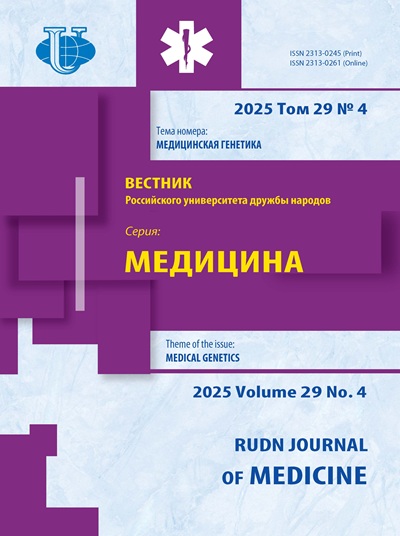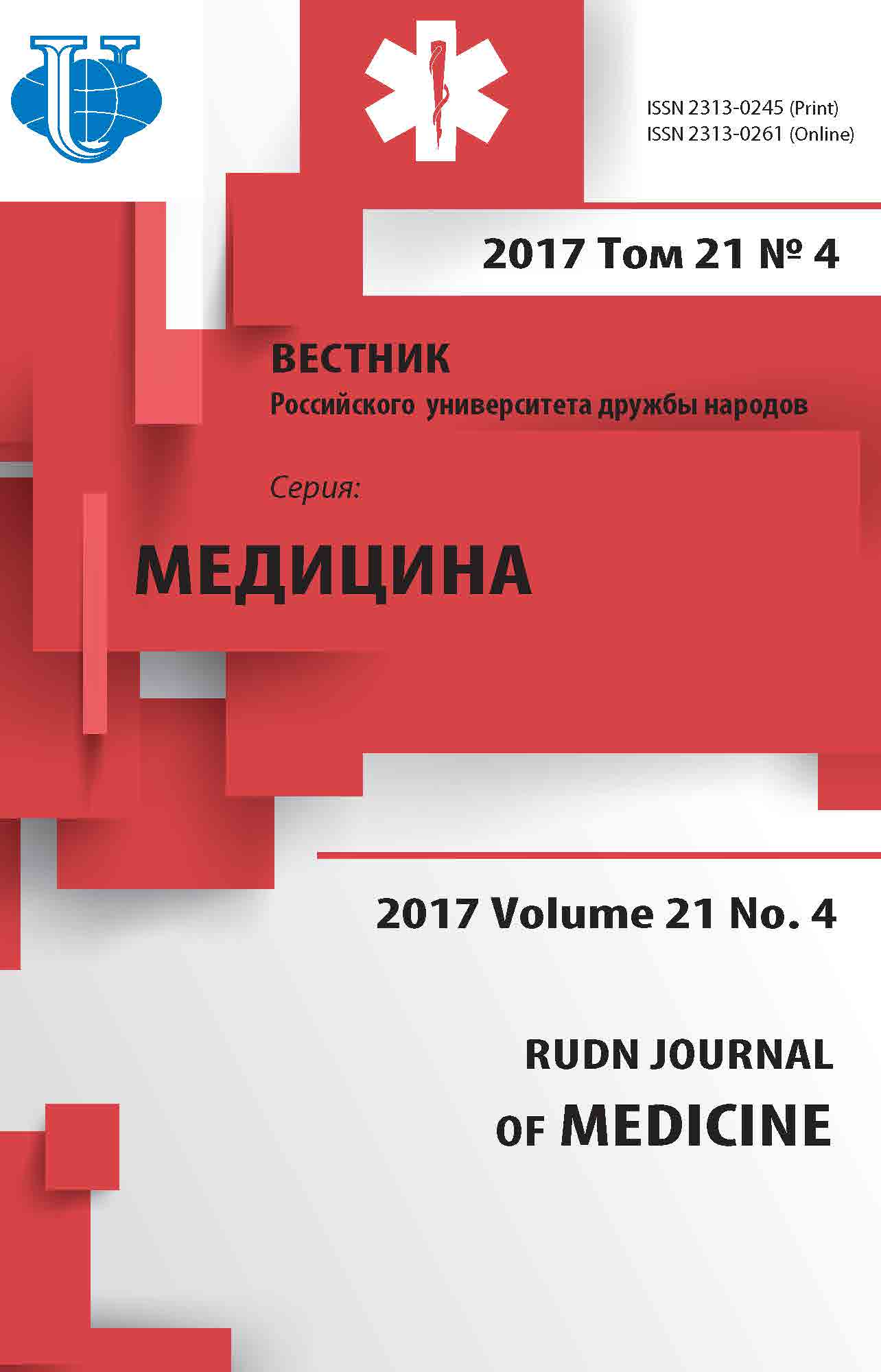Vol 21, No 4 (2017)
- Year: 2017
- Articles: 7
- URL: https://journals.rudn.ru/medicine/issue/view/1038
- DOI: https://doi.org/10.22363/2313-0245-2017-21-4
Full Issue
Articles
INFLUENCE OF ANESTHESIA ON POSTOPERATIVE PERIOD AFTER UTERINE REMOVAL
Abstract
The present study is devoted to the development of anesthesia tactics for the purpose of early recovery of patients after amputation of the uterus and shortening of hospitalization. The algorithm of pre-operative examination of middle-aged patients with uterine myoma is proposed to select the optimal method of anesthesia, which allows to optimize the postoperative period in women with an increased risk of develop-ing severe pain syndrome and postoperative cognitive impairment. The study showed the advantage of regional anesthesia with dexmedetomidine sedation in the operation of amputation of the uterus in the form of a lower incidence of postoperative cognitive dysfunction syndrome, marked postoperative pain, as well as a reduction in hospitalization, which in turn allows rationalizing the economic costs of medical institutions, as well as improving the population's satisfaction quality of care.
 393-401
393-401


INFLAMMATION AND MALE INFERTILITY. WHAT’S IS COMMON?
Abstract
All researchers identify the idiopathic forms of male infertility, which can hardly be cor-rected. Objectives: toidentify additional links to pathogenesis of idiopathic male infertility. Materials and methods of research: were examined 24 (54,5%) men with idiopathic non obstructive azoospermia. The comparison group was formed by 20 (45,5%) healthy male volunteers. In order to identify additional links of pathospermia pathogenesis, was determined the leucocytes activity in peripheral blood of patients. Results: in patients with pathospermia reliably more total number of WBC and higher production speed of reactive oxygen species by leukocytes for the selected time interval, in comparison with healthy men (p < 0,05). Conclusion: one of the reasons of non-obstructive azoospermia is chronic inflammations, which induce oxidative stress.
 402-407
402-407


FEATURES MULTIFACTOR FUNCTIONAL ANALYSIS IN A COMPREHENSIVE EXAMINATION OF PATIENTS WITH THE MEDIAN HERNIAS OF THE ANTERIOR ABDOMINAL WALL
Abstract
A functional review of 156 patients with a median hernia of anterior abdominal wall. The data series are included in the algorithm of multifunctional surgical treatment of medial hernias. The greatest number of matches with the algorithm (53,1%) was found when using the five-factor functional analysis. Among the four-factor diagnostic options in choosing a reliable method of hernioplasty combined proved sharing criteria for intra-abdominal pressure, electrofasciomyographya taking into account the size and location of medial hernia defects (41,3%).
 408-417
408-417


SURGICAL TREATMENT OF PATIENTS WITH CHRONIC PURULENT MAXILLARY SINUSITIS: A COMPARISON OF TRADITIONAL AND MINIMALLY INVASIVE METHODS OF SURGICAL TREATMENT
Abstract
Purpose: to compare the results of the traditional and minimally invasive methods of surgi-cal treatment performed for chronic purulent maxillary sinusitis. Materials and methods. We examined 100 patients with chronic suppurative maxillary sinusitis (one-sided process), 56 women and 44 men, aged 18 to 76 years (the average age is 40 years). All patients were divided into 3 groups. The main group was treated with balloon sinusoplasty. Two comparison groups were endoscopic and microsurgery through the anterior wall of the maxillary sinus. Main criteria for the effectiveness of surgical treatment of patients with chronic purulent the maxillary sinusitis was an endoscopic picture of the nasal cavity, evaluation of CT scan of paranasal sinuses, and a study of the transport function of ciliated epithelium. Results: Good and satisfactory results prevail in the main group of patients. Conclusion: balloon sinusoplasty can be recommended as one of the methods of choice in the treatment of patients with chronic purulent maxillary sinusitis.
 418-424
418-424


SPECIFIC FEATURES OF THE HEMODYNAMIC, RHEOLOGICAL AND BIOENERGETIC INDICATORS IN WEATHER-SENSITIVE PATIENTS WITH THE ARTERIAL HYPERTENSION
Abstract
Researches of the last years convincingly showed negative influence of climatic factors (cold, a heat, changes of atmospheric pressure, etc.) on a state of health of the population. The aim is to study the specific features of the hemodynamic, rheological and bioenergetic indicators in weather-sensitive patients with the arterial hypertension. Information and methods: 160 patients with the arterial hypertension grade 2 were examined (weather-sensitive patients - 100, nonweather-sensitive patients - 60). Complex clinical examination, tests on hemodynamic, rheological and bioenergetic indicators were conducted. Results. In many cases weather-sensitive patients with the arterial hyperten-sion grade 2 have a hyperkinetic kind of the bloodflow, contructive function’s overwork of the left ventricle, the arterial hypertension grade 3; the strengthening of aggregation and the reduction of the red cells deflectivity leading to extension of the blood viscosity in the microcirculatory bloodstream with tendency to thrombosis; the reduction of adenine nucleotides concentration in blood, the extention of skin electrial capacity. Conclusion. The onset of meteopathic reactions in patients with the arterial hypertension lead to the development of the negative hemodynamic status and systematic abnormalities of the microcirculation. Studing of the bioenergetic characteristic of the body tissues allows to predict meteopathic reactions and do their correction.
 425-431
425-431


DESIGN OF HPLC METHODS OF AFOBAZOLE QUANTITATIVE ANALYSIS IN BLOOD PLASMA
Abstract
The article describes a method of quantitative analysis of anxiolytic drug with neuropro-tective activity - fabomotizole (afobazole) in rabbit blood plasma by HPLC with UV detection at 302 nm. The analysis was performed in isocratic mode using Stayer chromatography system and a reversed-phase column Phenomenex Synergi 4u Polar-RP 80A (250х4.6,4 µm) and a mobile phase (acetonitrile-water-glacial acetic acid-triethylamine in the ratio 100 : 240 : 100 : 0,3 : 0,25) at pH 6.1. The retention time of test-substance was 10,00 +/- 0,11 min. Fabomotizole extraction from plasma carried using diethyl ether (1.5 ml plasma and 6 ml acetonitrile) by shaking on Shaker apparatus at 400 vol./min for 10 minutes, centrifuging at 3500 rpm. for 10 minutes and evaporation of the supernatant on a vacuum rotary evaporator at 40 C. The recovery was 87%. The developed technique is characterized by sensitivity, specificity, ease of implementation, repro-ducibility and linearity in the plasma concentration range after oral administration of 3.8 mg of the substance (Afobazol tablets, 10 mg, Pharmstandart-Leksredstva, Russia) to rabbits.
 432-439
432-439


SOCIO-DEMOGRAPHIC AND ECONOMIC CHARACTERISTICS OF FAMILIES OF MILITARY RETIREES APPLIED FOR DENTAL ORTHOPEDIC TREATMENT
Abstract
The article is devoted to the study of the medical and social characteristics of families of military retirees applied for dental orthopedic treatment. The following socio-demographic characteristics of the patients were studied: material status, level of education, financial status, access to benefits, employment. The researchis based on sociological research of military retirees’ self-reported health status materials (300 profiles). Most (93%) of the respondents live together with their spouse without children or with children. The majority (87.7%) assess the financial situation of the family as satisfactory. Among the working (31.3%) military retirees are satisfied with their work, in whole or in part, about 85.0%. Almost a third of respondents (37.5%) noted that they never pay for medical care; fewer say that they never pay for dental care (24.8%). Thus, dental care requires significantly higher costs.
 440-446
440-446
















